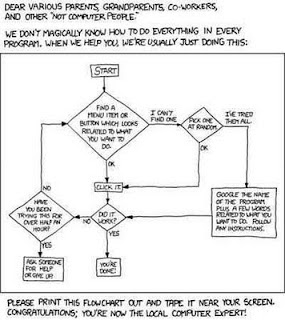Solving problems - some of us are good at it; others aren't quite so. But why should that be? We are possibly the best equipped animals on the planet at dealing with them. We have enlarged cerebellums, opposable thumbs and dextrous hands- the best tools for exploring and solving complex problems.
So how come certain people become seen as 'experts' within organisations? They aren't always the smartest people in the organisation. Time after time, the same people get singled out as being the one-stop shop for any kind of complex technical problem - whether it's accessing a new data source or fixing an errant process - they get the call. Yet when you see the decisions they make, they are pretty simple. how many of you remember this picture?
It's amusing but true. The decisions you need to make to solve problems are generally quite simple. But what singles out the people who solve problems well, is their ability to gather enough information to correctly specify them. A decent problem specification will include where the problem is occurring, when it first started, when it finished, the extent of the problem, the impact it has on other related systems and processes etc etc.
A simple barometer on how effective your problem specifications are, is when raising a problem, does the analyst that the problem is assigned to call the person who raised the error for more information? If your analysts are having to make repeated calls to customers, then not enough information is being gathered when the problem is first raised.
There are methods of specifying problems. my favourite is the Kepner Tregoe problem solving methodology. Check them out http://www.kepner-tregoe.com/.

No comments:
Post a Comment